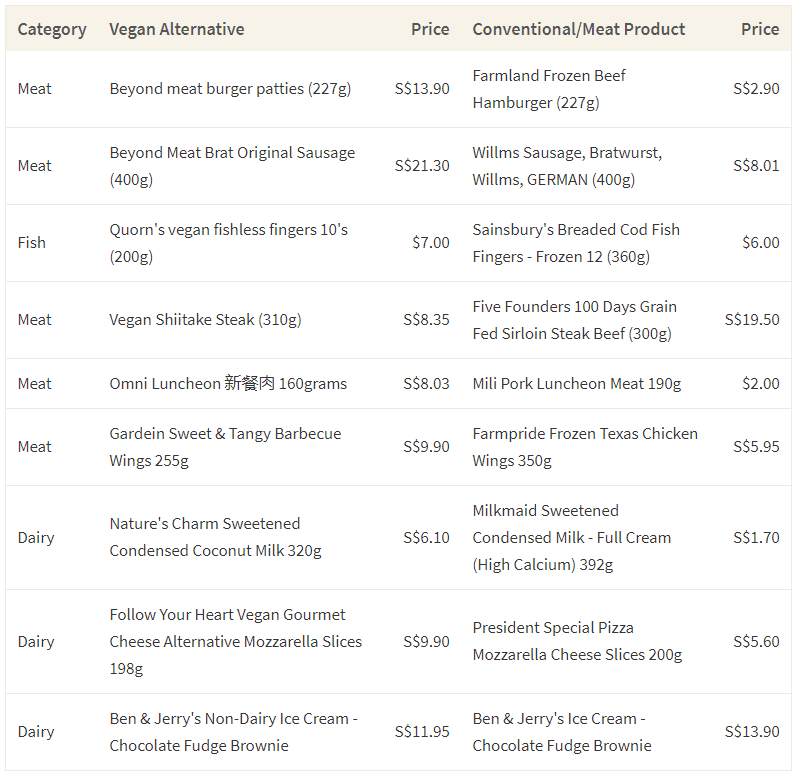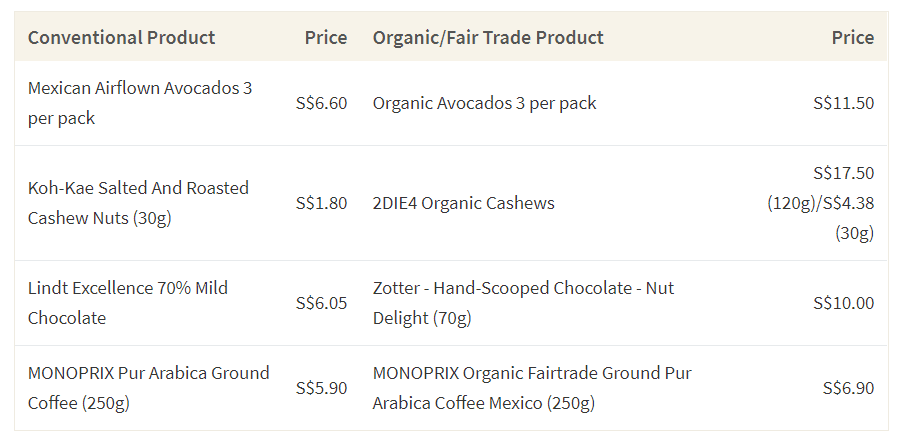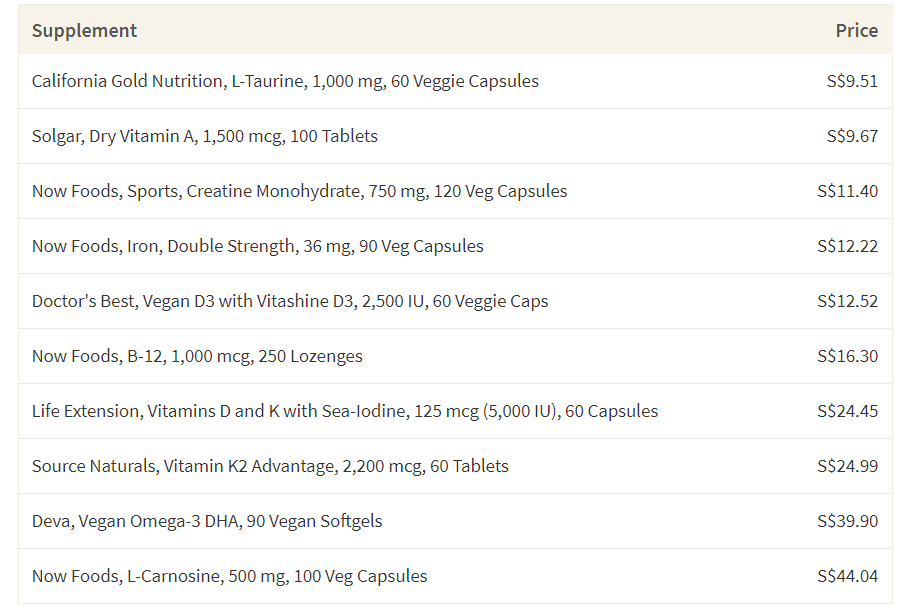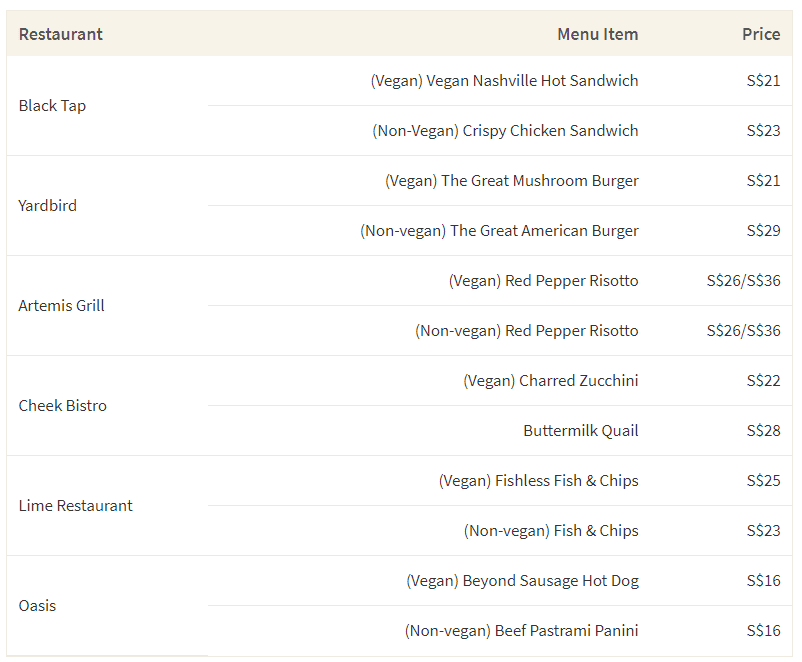How Affordable Is a Vegan Lifestyle in Singapore?
With the issues of climate change and the ethics of the meat industry being brought to light by documentaries like Cowspiracy, Forks Over Knives, The Game Changers, and Earthlings, the vegan movement has been growing in the West. Meanwhile in Singapore, recent news broke that lab-grown chicken has been given “first-in-the-world regulatory approval” by Singapore authorities to be sold in the country. As this product doesn’t involve the killing of animals or factory farming, it is most likely targeted at vegans and vegetarians who abstain from meat in protest of the meat industry. However, with lab-grown chicken sold at a “premium price” at initial roll-out, what other premiums do vegans have to pay for an ethical lifestyle? We find out in this article.
Vegan Substitutes Will Generally Cost More
While subsisting on a Whole-Foods Plant-Based diet which contains minimally processed food and solely fresh veggies, fruits, whole grains, legumes, seeds and nuts may be affordable, some vegans may still find the need to indulge in processed meat replacements and dairy alternatives for more variety in their day-to-day meals. The many vegan substitutes currently in the market show that there’s a demand for these products. According to this Global Plant-based Meat Market Report, “the global plant-based meat market by revenue is expected to grow at a CAGR of over 18% during the period 2019-2025.” Here’s a comparison between the prices of vegan substitutes and animal products.

With the exception of ice cream and steak, most vegan substitutes cost an average for 132% more than animal products, especially when there is only a small number of vegan brands that make up the market share at the moment. For instance, Beyond Meat burger patties and sausages, as well as Omnimeat Luncheon are priced 3-5 times higher than non-vegan ones. However, the prices of animal products can go higher than the vegan versions, depending on the brand you choose.
Considering the Cost of Inorganic vs Fair Trade/Organic
Some vegans consider certain fruits, nuts, beans and vegetables like avocados, almonds, kiwis, melon and butternut squash to be not vegan, as the farming of these fruits and veggies involves migratory beekeeping ie. the exploitation of bees. In addition to that, Mexico’s avocado industry has become a target for cartels, while the production of chocolate, coffee and cashews often involves forced and child labour. As part of an ethical vegan lifestyle, strict vegans may consider fair trade varieties of these products more acceptable to consume. Here, we compare the prices of the abovementioned inorganic products vs their fair trade counterparts.

Organic avocados and fair trade chocolate cost about 40% more than the inorganic mass-produced versions, while fair trade cashews cost 1.4 times more than mass-market cashews. As for coffee, the price difference between inorganic and organic fair-trade Arabica from MONOPRIX is just $1. That said, prices vary depending on the brand you choose, which means that it is possible to find fair trade coffee that's cheaper than mass-market coffee from world famous brands like Illy’s.
Additional Supplements Will Also Need To Be Considered
Several studies have shown than a vegan diet is lacking in many vitamins, minerals and nutrients like heme iron, vitamin B12, iodine, omega fatty acids, creatine and more found in meat, seafood and dairy which are more bioavailable, making it easier for the body to absorb. As fibre is an anti nutrient, a high-fibre diet lowers digestibility of vitamins and minerals. As such, vegans usually have to take a number of health supplements to help their body reach the optimum level required to function.

While some vegans may only need a few supplements to maintain optimal health, others may need more. If a vegan requires all of the supplements on this list, they would have to spend up to $205 every 2 to 6 months.
Cost of Dining Out
For vegans who want a peace of mind while dining out, the safest bet is to patronise vegan/vegan-friendly stalls, restaurants and eateries. When it comes to dining out, vegan food is actually cheaper than non-vegan in most cases. For instance, when it comes to hawker food, you can expect prices at vegetarian/vegan stalls to fall within the $2.50 - $5 range, which is comparable to the prices of non-vegan hawker dishes.

Furthermore, when dining at mid-range vegan-friendly restaurants, you’ll find that the price of the most expensive vegan dish runs between $22 to $30, while some of the most expensive meat and seafood dishes at non-vegan mid range restaurants may cost more than that due to the higher cost of meat. The prices of food also depends on the location of the restaurant or stall, with food priced higher in the CBD area.
Going Vegan Can Be Expensive, but There Are Ways To Save
While fruits and veggies are affordable especially if you opt for conventional options, a vegan lifestyle would require you to spend up to 379% more on food products (with a few exceptions). On top of that, there are extra expenses for health supplements that a vegan needs for their body to function optimally. Strict vegans will also have to pay a premium for ethically sourced, fair-trade, organic products. However, dining out will be easier on the wallet as the prices of vegan hawker food stays below $5 while the price of the most expensive dish in a mid-tier vegan restaurant falls below $40, due to the lower costs of vegan ingredients compared to more expensive meats and seafood like beef, lamb or salmon. To offset the higher expenses of a vegan lifestyle, we recommend pay for your groceries and vitamins with credit cards that give you cashback, rebates and rewards.
